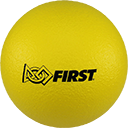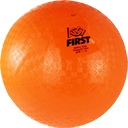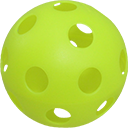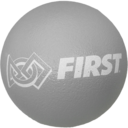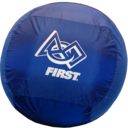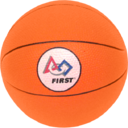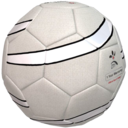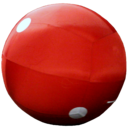Difference between revisions of "Balls"
(→Trackball (2008)) |
|||
| Line 162: | Line 162: | ||
The most common methods to hurdle the ball over the truss was to lift the ball up and either toss it with an [[arm]], or simply let the robot's momentum carry the ball. | The most common methods to hurdle the ball over the truss was to lift the ball up and either toss it with an [[arm]], or simply let the robot's momentum carry the ball. | ||
| − | Some higher-tier teams used linear [[Shooters#Punchers|punchers]] powered by [[springs]], surgical tubing, or [[pneumatics]]. | + | Some higher-tier teams used linear [[Shooters#Punchers|punchers]] powered by [[springs]], [[springs#elastics|surgical tubing]], or [[pneumatics]]. |
=== Noteworthy Robots === | === Noteworthy Robots === | ||
Revision as of 13:49, 6 June 2020
Balls are a category of game pieces commonly used by FIRST. Some balls can also be considered [Inflatables], although they are listed here as their "primary category." For our purposes, any spherical game piece is a "ball." 2009 Moon Rocks are an edge case, but are considered balls for this purpose.
Power Cell (2020)
Main article: 2020 FRC Season
Description
(Physical description of game piece)
Challenges
(What made this difficult)
Manipulation Strategies
Example 1
Example 2
Example 3
Noteworthy Robots
Cargo (2019)
Main article: 2019 FRC Season
Description
(Physical description of game piece)
Challenges
(What made this difficult)
Manipulation Strategies
Example 1
Example 2
Example 3
Noteworthy Robots
Fuel (2017)
Main article: 2017 FRC Season
Description
(Physical description of game piece)
Challenges
(What made this difficult)
Manipulation Strategies
Example 1
Example 2
Example 3
Noteworthy Robots
Boulder (2016)
Main article: 2016 FRC Season
Description
(Physical description of game piece)
Challenges
(What made this difficult)
Manipulation Strategies
Example 1
Example 2
Example 3
Noteworthy Robots
Ball (2014)
Main article: 2014 FRC Season
Description
(Physical description of game piece)
Challenges
(What made this difficult)
Manipulation Strategies
Example 1
Example 2
Example 3
Noteworthy Robots
Basketball (2012)
Main article: 2012 FRC Season
Description
(Physical description of game piece)
Challenges
(What made this difficult)
Manipulation Strategies
Example 1
Example 2
Example 3
Noteworthy Robots
Ball (2010)
Main article: 2010 FRC Season
Description
(Physical description of game piece)
Challenges
(What made this difficult)
Manipulation Strategies
Example 1
Example 2
Example 3
Noteworthy Robots
Moon Rock (2009)
Main article: 2009 FRC Season
Description
(Physical description of game piece)
Challenges
(What made this difficult)
Manipulation Strategies
Example 1
Example 2
Example 3
Noteworthy Robots
Trackball (2008)
Main article: 2008 FRC Season
Description
Trackballs were rubber yoga balls with a blue or red fabric covering. one of each color balls on the field had white dots to help vision tracking.
Diameter: 40in
Weight: 7.3lb
Challenges
The maximum footprint of a 2008 robot was 28" x 38", meaning that the game piece had a larger footprint than a robot. With a weight of 7.3lb, it was also relatively heavy for the smaller motors of the time.
Manipulation Strategies
Size Constraints
Robots mostly took one of two approaches to the size of this ball.
- A manipulator that starts inside the frame perimeter and extends out
- Holding the ball from the top or bottom, where a manipulator could fit within the 5' robot height limit
Hurdling
The most common methods to hurdle the ball over the truss was to lift the ball up and either toss it with an arm, or simply let the robot's momentum carry the ball.
Some higher-tier teams used linear punchers powered by springs, surgical tubing, or pneumatics.
Noteworthy Robots
| FRC1114 | FRC233 | FRC330 |
|---|---|---|
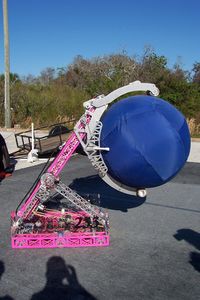 FRC233 found an excuse to use a pink arm and were Einstein semifinalists. |
